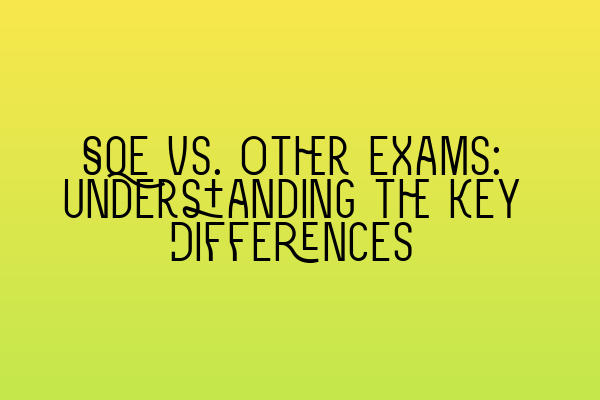SQE vs. Other Exams: Understanding the Key Differences
If you’re aspiring to become a solicitor in England and Wales, you may be aware of the upcoming changes to the qualification process. The Solicitors Qualifying Exam (SQE) is set to replace the traditional routes to qualification, including the Legal Practice Course (LPC) and the Qualified Lawyers Transfer Scheme (QLTS). In this blog post, we will explore the key differences between the SQE and other exams, providing you with the information you need to make an informed decision about your legal career.
The SQE: A New Approach to Qualification
The SQE is designed to be a more flexible and accessible way to qualify as a solicitor. It aims to streamline the process and ensure consistency in the assessment of candidates’ skills and knowledge. The SQE is divided into two stages: SQE1 and SQE2. SQE1 tests candidates’ functioning legal knowledge, while SQE2 focuses on practical legal skills.
One of the notable differences between the SQE and other exams is the removal of the need to complete the LPC or QLTS. Instead, candidates will need to pass both stages of the SQE and fulfill the Solicitors Regulation Authority’s (SRA) eligibility requirements.
Key Differences: SQE vs. Other Exams
Now, let’s delve into the key differences between the SQE and other exams:
1. Assessment Format:
The SQE introduces a new assessment format that incorporates multiple-choice questions (MCQs) and written tasks, including client interviewing and advocacy. This differs from the traditional exam formats, such as essay-style questions and problem-solving scenarios, commonly found in the LPC and QLTS.
2. Cost:
One advantage of the SQE is its potential to reduce costs. As the SQE consolidates the qualification process into two stages, candidates will save on the expenses associated with the LPC or QLTS. Moreover, the introduction of online resources and interactive mock tests can aid candidates in preparing for the exam, reducing the need for additional expensive study materials.
If you’re looking for essential tips and resources for success in property practice, check out our article on SQE Prep: Essential Tips and Resources for Success in Property Practice.
3. Experiential Learning:
The SQE places a greater emphasis on practical legal skills, ensuring that candidates are prepared to handle real-life legal situations. This focus on experiential learning sets the SQE apart from other exams, as it provides a more realistic representation of the demands solicitors face in their day-to-day practice.
4. Level of Autonomy:
The SQE offers more flexibility and autonomy in preparing for the exams. Candidates can choose the time and place of their assessments and have the option to rely on a wider range of resources, including online materials and interactive mock tests. This self-directed approach allows candidates to tailor their study schedule to their individual needs and preferences.
To sharpen your skills for the property practice exam, make sure to check out our interactive SQE mock tests for property: Sharpen Your Skills for Exam Success.
5. Assessment Results:
The SQE aims to provide more efficient and transparent feedback to candidates. The exam will be marked electronically, allowing for faster grading and results. This efficiency can significantly reduce the waiting time for candidates, giving them a quicker indication of their performance and allowing them to prepare for subsequent stages or re-sits.
Is the SQE Right for You?
The introduction of the SQE raises the question of whether this new qualification route is the right choice for prospective solicitors. The answer depends on your individual circumstances, career aspirations, and learning preferences. It is essential to thoroughly research and consider these factors before making a decision.
If you’re interested in joint ownership and legal considerations for co-owners of property, be sure to read our informative article on Joint Ownership: Legal Considerations for Co-Owners of Property.
Similarly, if you want to gain essential insights into commercial leases for business premises, our article on Commercial Leases: Essential Insights for Business Premises will provide you with valuable information.
In Conclusion
The SQE represents a significant shift in the qualification process for solicitors. Understanding the key differences between the SQE and other exams is crucial in making an informed decision about your legal career. It is important to consider factors such as assessment format, cost, experiential learning, level of autonomy, and assessment results when deciding on the most suitable qualification route for you.
For additional guidance on tenant rights in the UK and understanding your legal protections, check out our article on Tenant Rights in the UK: Understanding Your Legal Protections.
Remember, each qualification route has its own advantages and considerations. Take the time to evaluate your options and seek professional advice to ensure you make the best decision for your legal career.

Leave a Reply